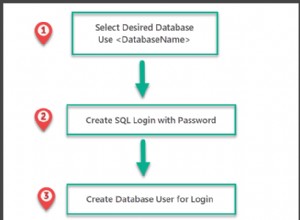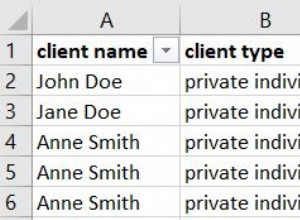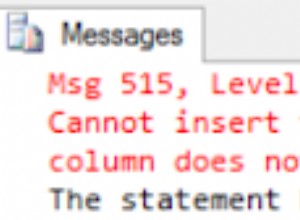vea el siguiente ejemplo
SELECT mydate calendar_date
,EXTRACT(WEEK FROM mydate) week_num
,EXTRACT(month FROM mydate) month_num
,to_char(mydate,'Mon') month_name
,EXTRACT(Quarter FROM mydate) quarter_num
,EXTRACT(year FROM mydate) calendar_year
,EXTRACT(DOW FROM mydate) iso_dayofweek
,to_char(mydate, 'day') dayofweek_name
FROM (
SELECT now()::DATE mydate
) t
Resultado:
calendar_date week_num month_num month_name quarter_num calendar_year iso_dayofweek dayofweek_name
------------- -------- --------- ---------- ----------- ------------- ------------- --------------
2015/04/24 17 4 Apr 2 2015 5 friday
Puedes usar generate_series() para obtener todas las fechas en un año, por ejemplo:2015
select generate_series(0,364) + date'1/1/2015'
esto producirá una fecha de 1/1/2015 - 31/12/2015 y utilice esta seleccionar en lugar de SELECT now()::DATE en el ejemplo dado
Si desea crear una tabla para el año 2015 entonces puedes usar la siguiente consulta
CREATE TABLE mycal_2015 AS
SELECT row_number() OVER () date_key
,mydate calendar_date
,EXTRACT(WEEK FROM mydate) week_num
,EXTRACT(month FROM mydate) month_num
,to_char(mydate,'Mon') month_name
,EXTRACT(Quarter FROM mydate) quarter_num
,EXTRACT(year FROM mydate) calendar_year
,EXTRACT(DOW FROM mydate) iso_dayofweek
,to_char(mydate, 'day') dayofweek_name
FROM (
SELECT generate_series(0, 364) + DATE '1/1/2015' mydate
) t
y la tabla se verá como select * from mycal_2015
date_key calendar_date week_num month_num month_name quarter_num calendar_year iso_dayofweek dayofweek_name
-------- ------------- -------- --------- ---------- ----------- ------------- ------------- --------------
1 2015/01/01 1 1 Jan 1 2015 4 thursday
2 2015/01/02 1 1 Jan 1 2015 5 friday
3 2015/01/03 1 1 Jan 1 2015 6 saturday
4 2015/01/04 1 1 Jan 1 2015 0 sunday
5 2015/01/05 2 1 Jan 1 2015 1 monday
6 2015/01/06 2 1 Jan 1 2015 2 tuesday
...
.
.
.
364 2015/12/30 53 12 Dec 4 2015 3 wednesday
365 2015/12/31 53 12 Dec 4 2015 4 thursday
POSTGRESQL:FUNCIÓN DE EXTRACCIÓN
La función de extracción de PostgreSQL extrae partes de una fecha
Sintaxis:extract( unit from date )
fecha es un valor de fecha, marca de tiempo, hora o intervalo del que se extraerá la parte de fecha.
unidad es el tipo de unidad del intervalo, como día, mes, minuto, hora, etc.
Puede ser uno de los siguientes:
unit description
--------------- -----------------------------------------------------------------------------------------------------------------------------
century Uses the Gregorian calendar where the first century starts at '0001-01-01 00:00:00 AD'
day Day of the month (1 to 31)
decade Year divided by 10
dow Day of the week (0=Sunday, 1=Monday, 2=Tuesday, ... 6=Saturday)
doy Day of the year (1=first day of year, 365/366=last day of the year, depending if it is a leap year)
epoch Number of seconds since '1970-01-01 00:00:00 UTC', if date value. Number of seconds in an interval, if interval value
hour Hour (0 to 23)
isodow Day of the week (1=Monday, 2=Tuesday, 3=Wednesday, ... 7=Sunday)
isoyear ISO 8601 year value (where the year begins on the Monday of the week that contains January 4th)
microseconds Seconds (and fractional seconds) multiplied by 1,000,000
millennium Millennium value
milliseconds Seconds (and fractional seconds) multiplied by 1,000
minute Minute (0 to 59)
month Number for the month (1 to 12), if date value. Number of months (0 to 11), if interval value
quarter Quarter (1 to 4)
second Seconds (and fractional seconds)
timezone Time zone offset from UTC, expressed in seconds
timezone_hour Hour portion of the time zone offset from UTC
timezone_minute Minute portion of the time zone offset from UTC
week Number of the week of the year based on ISO 8601 (where the year begins on the Monday of the week that contains January 4th)
year Year as 4-digits
Nota:la función de extracción se aplica a PostgreSQL versión 8.4 y superior
Funciones y operadores de fecha/hora
generar_series()




